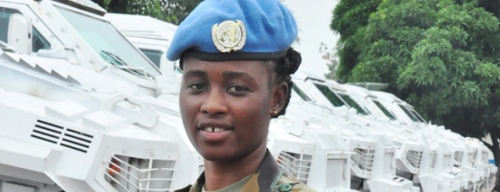Ghanaian UN peacekeeping driver says driving in DR Congo is challenging as drivers sometimes do not follow traffic regulations.
According to Takyiwaa Esther, despite some challenging times on the road, she loves the highways in DR Congo and their vegetations.
Can you tell us a bit about yourself?
My name is Takyiwaa Esther from Ghana. I am 24 years old and my hobbies include listening to music and reading.
How long have you been a peacekeeper and what are your responsibilities?
I have been a Peacekeeper for two months now. Currently, I am a driver with the Ghana Battalion (GHANBATT) deployed in the Democratic Republic of the Congo. This is my first mission as a UN peacekeeper.
Why did you choose this career? How did you become a UN Peacekeeper?
I chose this career because it has always been my passion to join the military and to serve as a UN peacekeeper.
What is your typical day like?
I go for a run every morning before taking my breakfast. I then head to the Mechanical Transport section where I work on my fuel returns. As a driver, I am almost always on the road transporting troops or supplies from one point to the other.
What are some of the highlights of your service at your current peacekeeping mission? What are three things you like most about the country you are deployed in?
Some of my highlights here are when we conduct civil-military activities to win the trust of the public and also when we undertake standing combat operations and provide security for our camp.
What I like about this country?
I like the highways in the DR Congo, plus the people are friendly and easy to approach. The weather and the vegetation are beautiful.
What part of your job do you find most challenging and why?
Driving in town is sometimes difficult when other drivers do not follow traffic regulations. There is also the language barrier.
What did your family and friends back home think about your decision to leave your country and work for a UN peacekeeping mission?
My family thinks I am a brave woman and are very proud of me. They see me as a hero for serving as a UN Peacekeeper.
What do you do when you have some spare time?
After a hard day’s work, I take time to read and relax. I also listen to some music.
Where do you see yourself in 5 years?
I see myself as a Corporal in the Ghana Armed Forces and undertaking other UN-related assignments.
What would you say to young people considering a career in peacekeeping?
If you consider a career in peacekeeping, take the opportunity when it comes as it can broaden your experience and your vision, especially as a soldier.
Credit : un.org





